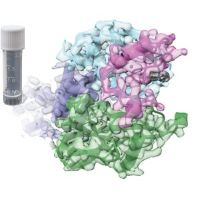Specification
| Description | Recombinant protein from the full-length sequence of Homo sapiens serine/threonine kinase 4 (STK4), transcript variant 1 (NM_006282). |
| Organism | Homo sapiens (Human) |
| Expression Host | Human Cells |
| Tag Info | His or DYKDDDDK. Please contact us if you need further information or require specific designed tag. |
| Purity | Greater than 90% by SDS-PAGE gel |
| Uniprot ID | Q13043 |
| Entry Name | STK4_HUMAN |
| Gene Names | STK4 KRS2 MST1 |
| Alternative Gene Names | KRS2 MST1 |
| Alternative Protein Names | Serine/threonine-protein kinase 4 (EC 2.7.11.1) (Mammalian STE20-like protein kinase 1) (MST-1) (STE20-like kinase MST1) (Serine/threonine-protein kinase Krs-2) [Cleaved into: Serine/threonine-protein kinase 4 37kDa subunit (MST1/N); Serine/threonine-protein kinase 4 18kDa subunit (MST1/C)] |
| Application | Antigens, Western, ELISA and other in vitro binding or in vivo functional assays, and protein-protein interaction studies; For research & development use only! |
| Buffer | Purified protein formulated in a sterile solution of PBS buffer, pH7.2, without any preservatives |
| Endotoxin | Endotoxin level is < 0.1 ng/µg of protein (<1EU /µg) |
| Length | 487 |
| Molecular Weight(Da) | 55630 |
| Protein Sequence | (The sequence of expressed protein may have some variation from the sequence shown below. Please contact us for the exact sequence.) METVQLRNPPRRQLKKLDEDSLTKQPEEVFDVLEKLGEGSYGSVYKAIHKETGQIVAIKQVPVESDLQEIIKEISIMQQCDSPHVVKYYGSYFKNTDLWIVMEYCGAGSVSDIIRLRNKTLTEDEIATILQSTLKGLEYLHFMRKIHRDIKAGNILLNTEGHAKLADFGVAGQLTDTMAKRNTVIGTPFWMAPEVIQEIGYNCVADIWSLGITAIEMAEGKPPYADIHPMRAIFMIPTNPPPTFRKPELWSDNFTDFVKQCLVKSPEQRATATQLLQHPFVRSAKGVSILRDLINEAMDVKLKRQESQQREVDQDDEENSEEDEMDSGTMVRAVGDEMGTVRVASTMTDGANTMIEHDDTLPSQLGTMVINAEDEEEEGTMKRRDETMQPAKPSFLEYFEQKEKENQINSFGKSVPGPLKNSSDWKIPQDGDYEFLKSWTVEDLQKRLLALDPMMEQEIEEIRQKYQSKRQPILDAIEAKKRRQQNF |
Background
| Function | FUNCTION: Stress-activated, pro-apoptotic kinase which, following caspase-cleavage, enters the nucleus and induces chromatin condensation followed by internucleosomal DNA fragmentation. Key component of the Hippo signaling pathway which plays a pivotal role in organ size control and tumor suppression by restricting proliferation and promoting apoptosis. The core of this pathway is composed of a kinase cascade wherein STK3/MST2 and STK4/MST1, in complex with its regulatory protein SAV1, phosphorylates and activates LATS1/2 in complex with its regulatory protein MOB1, which in turn phosphorylates and inactivates YAP1 oncoprotein and WWTR1/TAZ. Phosphorylation of YAP1 by LATS2 inhibits its translocation into the nucleus to regulate cellular genes important for cell proliferation, cell death, and cell migration. STK3/MST2 and STK4/MST1 are required to repress proliferation of mature hepatocytes, to prevent activation of facultative adult liver stem cells (oval cells), and to inhibit tumor formation (By similarity). Phosphorylates 'Ser-14' of histone H2B (H2BS14ph) during apoptosis. Phosphorylates FOXO3 upon oxidative stress, which results in its nuclear translocation and cell death initiation. Phosphorylates MOBKL1A, MOBKL1B and RASSF2. Phosphorylates TNNI3 (cardiac Tn-I) and alters its binding affinity to TNNC1 (cardiac Tn-C) and TNNT2 (cardiac Tn-T). Phosphorylates FOXO1 on 'Ser-212' and regulates its activation and stimulates transcription of PMAIP1 in a FOXO1-dependent manner. Phosphorylates SIRT1 and inhibits SIRT1-mediated p53/TP53 deacetylation, thereby promoting p53/TP53 dependent transcription and apoptosis upon DNA damage. Acts as an inhibitor of PKB/AKT1. Phosphorylates AR on 'Ser-650' and suppresses its activity by intersecting with PKB/AKT1 signaling and antagonizing formation of AR-chromatin complexes. {ECO:0000250|UniProtKB:Q9JI11, ECO:0000269|PubMed:11278283, ECO:0000269|PubMed:11517310, ECO:0000269|PubMed:12757711, ECO:0000269|PubMed:15109305, ECO:0000269|PubMed:16510573, ECO:0000269|PubMed:16751106, ECO:0000269|PubMed:16930133, ECO:0000269|PubMed:17932490, ECO:0000269|PubMed:18328708, ECO:0000269|PubMed:18986304, ECO:0000269|PubMed:19525978, ECO:0000269|PubMed:21212262, ECO:0000269|PubMed:21245099, ECO:0000269|PubMed:21512132, ECO:0000269|PubMed:8702870, ECO:0000269|PubMed:8816758}. |
| Pathway | |
| Protein Families | Protein kinase superfamily, STE Ser/Thr protein kinase family, STE20 subfamily |
| Tissue Specificity | Expressed in prostate cancer and levels increase from the normal to the malignant state (at protein level). Ubiquitously expressed. {ECO:0000269|PubMed:17932490}. |
QC Data
| Note | Please contact us for QC Data |
| Product Image (Reference Only) |  |

